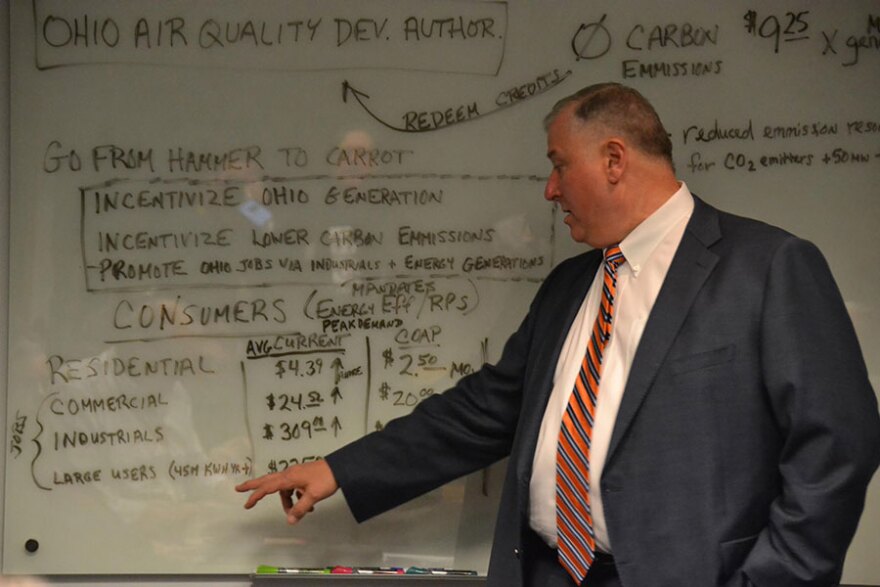A new proposal in the Ohio House would do away with renewable and efficiency standards, drawing a new fund to reward not only solar and wind production, but also nuclear power.
The plan, HB6, would create the Ohio Clean Air Program and grant credits to any energy source that doesn’t emit carbon.
House Speaker Larry Householder (R-Glenford) says this creates a completely different tactic to incentivizing clean energy. For the past decade, Ohio has been operating under green energy standards that require utilities to use a certain about of renewables and achieve a certain amount of efficiency through annual benchmarks.
Householder compares the current approach to a hammer that forces investment into renewables.
“We’re trying to go from the hammer of the mandates and do away with the mandates and instead provide a carrot to those people who are generating energy in the state of Ohio to try to have lower carbon emissions,” Householder says.
The new program would continue rewarding money to renewables like wind and solar projects, but add nuclear power to list of power generators getting credits.
The legislation would charge residential customers $2.50 a month on their electric bills, $20 for commercial ratepayers, $250 for industrial ratepayers, and $2,500 for the largest industrial ratepayers. This creates a pot of about $300 million. The money would then be rewarded to any energy generation that doesn’t emit carbon. That would go for a rate of $9.25 a megawatt hour.
Opponents have said that gives a major boost to nuclear energy which would end up being regarded as a clean energy source competing on the same level as wind and solar. Householder disagrees.
“If they provide low emissions or zero emissions to the state of Ohio and they’re generating in the state of Ohio, they’re going to receive a credit through the Ohio Air Quality Development Authority. How’s that competing with anybody. The only competition is whether they can do it or not. So let’s put the rubber on the road and if they can do it, come on in, do it, we’ll give you an incentive for it,” Householder says.
Neil Waggoner, with Sierra Club’s Beyond Coal Campaign, says this sends a bad signal to any prospective renewable energy developers.
“When you’re increasing customer bills to bailout old, uncompetitive, uneconomic nuclear plants and you’re going and gutting the clean energy and efficiency standards it’s pretty clear that their goal here is to support these old plants and to discourage investment in clean energy,” Waggoner says.
FirstEnergy Solutions has spent years calling for legislative help to prop up their struggling power plants. The most recent effort has centered around their nuclear plants which are scheduled to close by 2021.
Under Householder’s formula, the state’s two nuclear plants would receive $170 million. The bill is sponsored by Republican Representative Jamie Callender who represents Lake County, where the Perry Nuclear Plant is located. Householder said he had no idea whether this plan will end up saving the two nuclear plants, Perry and Davis-Besse.
“How does this benefit the people of Ohio? I just don’t see how this benefits the people of Ohio,” asks Rep. David Leland (D-Columbus) who will be the ranking member of the committee hearing the bill.
He says the state’s current renewable energy standards are working and encourages more development of wind and solar projects in Ohio.
A major area of concern for Leland is a provision in the bill that would grant money to power plants that take steps to lower their carbon emissions. He says that means the Ohio Clean Air Program could end up granting money to coal plants.
“We need to be encouraging real clean energy investment in the state of Ohio. Coal plants certainly don’t fit into that definition in my mind. So again it’s a question about how we’re gonna spend the money, what we’re gonna spend the money on,” Leland says.
The bill will soon begin hearings in the House energy generation subcommittee which Householder says was created specifically for this issue.







